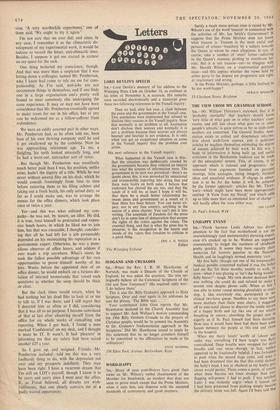LORD DEVLIN'S SPEECH SR,—Lord Devlin's memory of his address to
the Winnipeg Press Club on October 16, as outlined in his letter of November 6, is accurate. His remarks were recorded electronically and a transcript gives these two following references to the Vassall inquiry:
Then we had, only last year, a clash between the press and the government in the Vassall case. Two journalists were imprisoned but refused to disclose their sources in the Vassall inquiry. Now that normally is no problem at all. Journalists don't disclose their sources and normally it is not a problem because their sources are always hearsay and hearsay is not evidence. It is only when you get an exceptional situation as arose in the Vassall inquiry that the problem ever arises.
His next reference to the Vassall inquiry: What happened in the Vassall case is this: that the situation was deliberately created by the government because they ordered an inquiry into what the sources of information were. The government in its turn was provoked—there's no doubt about this, it was provoked by sensational and irresponsible reporting into doing that and there were faults on both sides. I believe that explosion has cleared the air, too, and that the result of it will be, at least I hope it will be, that there be a much better relationship be- tween press and government as a result of it than there has been before. You can never ex- pect, not in any free country, anything in the nature of a press charter. You can't put it into writing. The essentials of freedom for the press don't lie in some line of demarcation that secures the rights of the critics against the rulers. The essential thing, and that is what the press has to preserve, is the recognition in the hearts and minds of the rulers that freedom to criticise is a good thing.
The Winnipeg Tribune'
ERIC J. II. WELLS
Editor


































 Previous page
Previous page